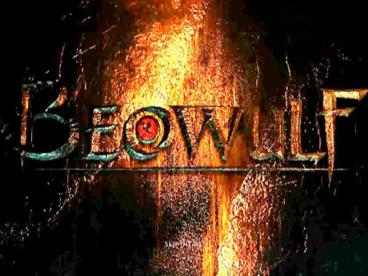We Begin With a Loss - PowerPoint PPT Presentation
1 / 12
Title:
We Begin With a Loss
Description:
We Begin With a Loss Beowulf was part of an oral tradition Few written records 19th century Badly burned We may never know how it really goes Understanding lost ... – PowerPoint PPT presentation
Number of Views:98
Avg rating:3.0/5.0
Title: We Begin With a Loss
1
(No Transcript)
2
We Begin With a Loss
- Beowulf was part of an oral tradition
- Few written records
- 19th century
- Badly burned
- We may never know how it really goes
- Understanding lost
- Oral tradition lost
- Missing text
3
Heaneys Translation
- Various authors tried translating Beowulf
- Heaney (2000)
- Fairly faithful
- Readable
- Heaney initially struggled to translate the poem
- He still doesnt speak/read Old English
4
Heaneys Translation, Continued
- He noticed the presence of Anglo-Saxon traditions
in his poetry - Fascinated by linguistic bleed-over
- Between Old English and contemporary language
- Irish / English relationships
- Theorized that precise language changes, but that
meaning and feeling remain unchanged - Attacked the work again and found success
5
Breaking Down the Poem
- Heaney has a prejudice for forthright delivery.
- You can see this in the way he captures the Old
English Poets voice - Even when the language is flowery, the voice is
direct - Readers appreciate this approach because Heaney
makes challenging passages a bit easier
6
Poetry Terms!
- Kenning A combination of two or more words that
can be substituted for an original term - One of the two words (the base word) relates to
the other word in a way that allows the new term
to replace the old one - For example, ocean whale road whale-road
- Human body bones held together bone-house
- Other kennings can have many words what do you
think sleep of the sword replaces?
7
Poetry Terms!
- Alliteration Refers to the repetition of a
vowel or consonant sound (not necessarily the
letter itself) in the beginning of each word in a
series - It can only occur at the beginning of a word
- We have numerous examples of this!
8
Analyze a Bit of Alliteration!
- There was Shield Sheafson, scourge of many
tribes. - as his powers waxed and his worth was proved.
- the path to power among people everywhere.
9
Poetry Terms!
- Assonance and consonance also refer to repeated
sounds in a string of words - Assonance refers to a repeated vowel sound
- Consonance refers to a repeated consonant sound
- Unlike alliteration, consonance and assonance can
occur anywhere within a word beginning, middle,
or end!
10
Poetry Terms
- Enjambment refers to a sentence in a poem that
continues over multiple lines - He was well-regarded and ruled the Danes
- For a long time after his father took leave
- Of his life on Earth. And then his heir
11
Poetry Terms
- Meter refers to the rhythmic pattern of a line of
poetry - Syllables form the basic rhythmic units of poetry
- The various groups of stressed or unstressed
syllables form feet. - Types of meter are defined by the number and
nature of syllables in a given line
12
Major Types of Feet
- Youll run into four common feet
- Iamb Unstressed/Stressed (Trapeze)
- Trochee Stressed/Unstressed (Hazel)
- Anapest Unstressed/Unstressed/Stressed (ex Dr.
Seuss) - Dactyl Stressed/Unstressed/Unstressed
(Marmalade) - The analysis of the rhythmic and linguistic
features of a poem is called scansion. - Finally, the study of the elements of language
that contribute to rhythmic and acoustic effects
in poetry is called prosody.































